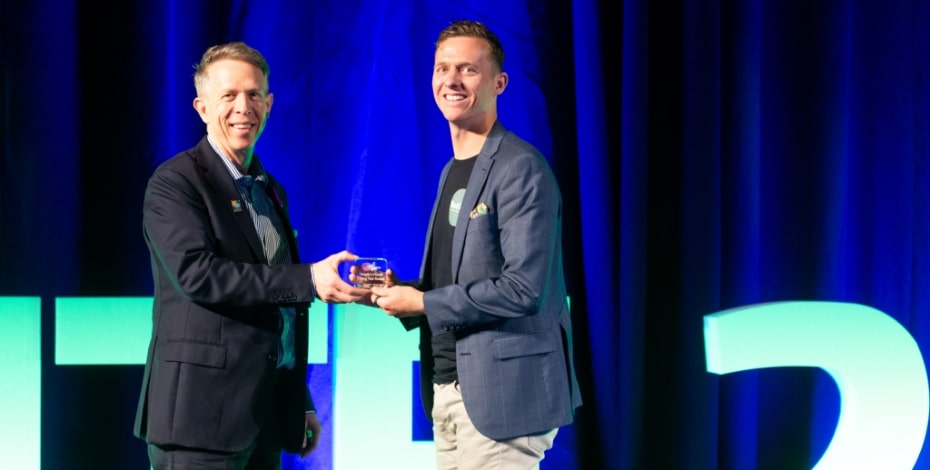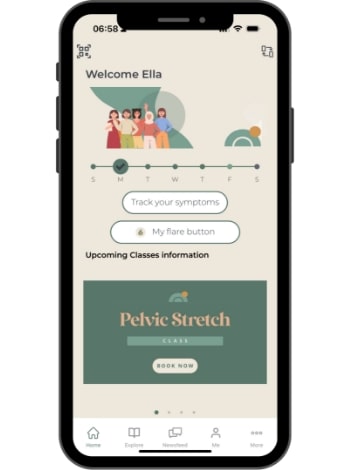
Endometriosis support on your phone

Matilda, an app for people with endometriosis, won the 2023 People’s Choice Rising Star Award at the Physiotherapy Research Foundation’s Physio Pitchfest at last October’s conference. Founders Kevin Wernli and Joanna Morris talk about the development of Matilda and where they plan to take it.
Early in 2022, physiotherapists Dr Kevin Wernli APAM and Joanna Morris APAM were chatting at a dinner about chronic pain and endometriosis, topics of interest to them both.
Kevin had recently completed the iPREP Biodesign PhD Internship program through Perth Biodesign, where he worked on a digital platform for mental health, and he suggested developing a digital health approach to endometriosis.
‘I thought that I would just do a weekend course but we ended up doing the full course and winning it,’ says Joanna, a pelvic health physiotherapist in Perth.
The Perth Biodesign for Digital Health course allowed the two physiotherapists to spend four months developing Matilda, a digital platform empowering people with endometriosis to take control of their health and to implement positive, evidence-based behaviours to improve their symptoms before or after laparoscopic surgery and throughout the life course of the condition.
‘It’s very typical of the two of us—why would we do something small when we could do something very big?’ Joanna says.
Since completing the course—and taking out first prize for their project—Joanna and Kevin have continued to develop Matilda as an app for people with endometriosis.
Last October, Matilda was pitched to a team of judges in front of an audience at the Physiotherapy Research Foundation’s 2023 Physio Pitchfest. While they didn’t take home the main prize, the Matilda founders came away with the People’s Choice Rising Star Award, worth $1000.
Endometriosis is a chronic condition where cells similar to those that line the uterus are found in other parts of the body, mainly in the pelvis and reproductive organs.
The condition, which affects around 10 per cent of all women and other people with uteruses, causes mild to severe pain, often results in infertility and is difficult to diagnose.
While it has no cure, treatments ranging from contraceptive control of menstrual cycles to surgery, as well as other conservative approaches, can help.
Physiotherapy might not immediately come to mind as an essential aspect of care for endometriosis but Joanna and Kevin say it offers a lot.
‘There are many problems with endo, and holistic care providers such as physios, dietitians, naturopaths and psychologists are critical.
‘This kind of care really should be provided to all people with endometriosis, but it’s not affordable or accessible,’ Joanna says.
She explains that physiotherapy takes a holistic approach, looking at several aspects of endometriosis including the nervous system’s response to chronic pain, pain during sexual intercourse and pelvic floor training to optimise bowel habits.
‘Endometriosis is a chronic inflammatory disease and we know that things like exercise are good for inflammation,’ she says.
Kevin, a physiotherapist, 2017 PRF Project Grant recipient and researcher who completed a PhD in 2022 looking at the relationship between low back pain, movement and posture, says that in people with chronic low back pain, psychological stress or emotional challenges can trigger pain flares. He says that many of the same factors are at play in people with endometriosis.
‘When we look at people recovering from pain, it’s kind of a multidimensional shift of a whole bunch of beliefs, a whole bunch of movement patterns, a whole bunch of thoughts, emotions, experiences, stress systems and understandings,’ he says.
‘We’re trying to help people to understand the complex or multidimensional factors that go into why they are sore, to understand what their pain does and doesn’t mean and, importantly, to have strategies to reduce their pain and improve their quality of life.’

The Matilda app is available online and through the app stores, with the next version set for release in March 2024 following lots of user feedback
The Matilda app allows users to track their symptoms and lifestyle habits such as diet, exercise and sleep; to learn from an evidence-based resource library; to access a community of likeminded peers; and to attend classes with holistic care experts including physiotherapists, dietitians, naturopaths and psychologists.
The app is available online and through the app stores, with the next version set for release in March 2024 following lots of user feedback.
An important aspect of the Matilda project is co-design—Joanna and Kevin have set up a ‘lived experience’ advisory board to ensure that the app meets the needs of the endometriosis community.
‘The problem with endometriosis is that it’s quite variable.
‘So being able to understand how each user’s endo presents is quite important so that we can tailor what they spend their time on,’ Joanna says.
With more than 700 downloads in 27 countries so far and around 120 monthly active users, the app is slowly building a following, Joanna and Kevin say.
Marketing has largely been organic, with many of the government-funded endometriosis and pelvic pain clinics around Australia recommending the app to their patients.
Joanna and Kevin are working with endometriosis support groups and organisations, as well as clinicians like pelvic health physiotherapists to get the word out about the app.
In the meantime, the two founders are working their way through a wish list of functions for the app.
One thing they are looking at is tailoring the information presented to give each user an individualised journey, says Joanna.
‘One thing we talk about a lot is how smart our tracker can be.
‘At the moment we have manual trackers where people implement things about their lifestyle and habits, but how well can we notice trends to understand the individual a bit better?’ Joanna says.
Kevin says new technologies including large language models and artificial intelligence offer opportunities to build a more responsive app.
For example, if the tracker picked up poor sleep and correlated it to an increase in pain, it could alert the user to the link between poor sleep and increased pain, potentially helping them to avert a flare.
‘Everyone knows sleep is important but when it’s linked to your own data, that information is much more powerful,’ he says.
Matilda has received funding from an Innovation Booster grant from the West Australian Government, Curtin Accelerate, the Lotterywest IdeaStarter fund and Plus Eight during its development.
They’re currently part-way through a pre-seed fundraising round with international female-only investment collective Epic Angels, Tripple Impact investors, and a number of angel investors including members of the clinical advisory board committing to the round subject to due diligence.
This funding will help them expand the product, conduct research, and progress opportunities in the National Health System in the UK.
While Joanna and Kevin juggle Matilda with their clinical work, parenting (in Joanna’s case), and teaching/research (in Kevin’s case), they are slowly adding to the team, with a newly hired marketing and tech lead to help grow the platform.
The two founders are delighted with the progress of the app so far.
‘We’re pretty chuffed that we’ve got something out to market, being two clinicians.
‘If you told us that 18 months ago, we’d both be having a bit of a laugh, I think,’ Joanna says.
>> The 2023 Physiotherapy Research Foundation Physio Pitchfest was proudly sponsored by VALD Health.
>> Click here for more information about Matilda Health and the Matilda app.
COURSE OF INTEREST
Medical management of endometriosis and persistent pelvic pain
© Copyright 2025 by Australian Physiotherapy Association. All rights reserved.





